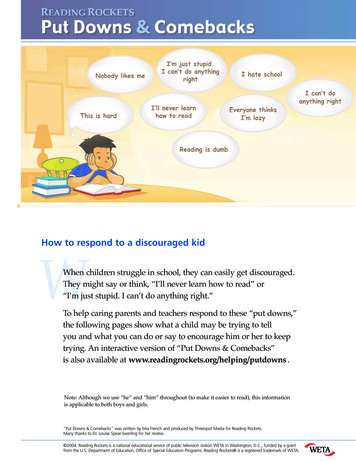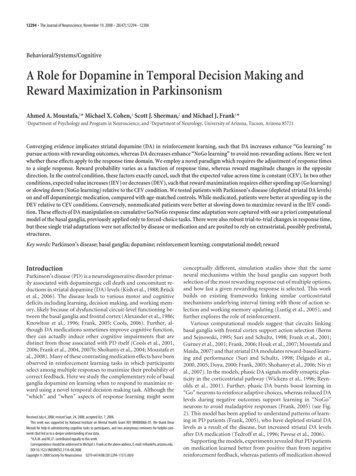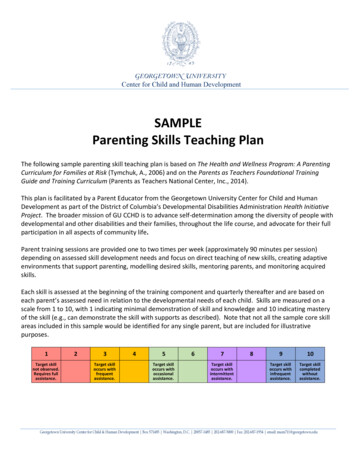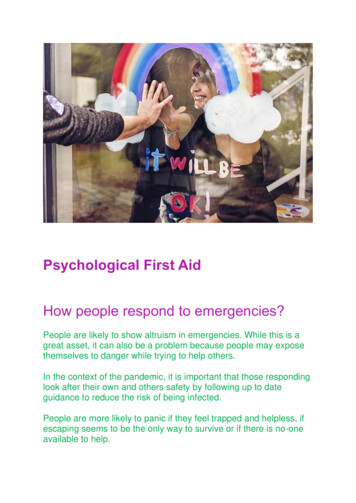
Transcription
How to respond to a discouraged kidWWhen children struggle in school, they can easily get discouraged.They might say or think, “I’ll never learn how to read” or“I’m just stupid. I can’t do anything right.”To help caring parents and teachers respond to these “put downs,”the following pages show what a child may be trying to tellyou and what you can do or say to encourage him or her to keeptrying. An interactive version of “Put Downs & Comebacks”is also available at www.readingrockets.org/helping/putdowns .Note: Although we use “he” and “him” throughout (to make it easier to read), this informationis applicable to both boys and girls.“Put Downs & Comebacks” was written by Mia French and produced by Threespot Media for Reading Rockets.Many thanks to Dr. Louise Spear-Swerling for her review. 2004. Reading Rockets is a national educational service of public television station WETA in Washington, D.C., funded by a grantfrom the U.S. Department of Education, Office of Special Education Programs. Reading Rockets is a registered trademark of WETA.
“Nobody likes me.”What your child may be trying to tell you I’m having trouble making friendsI do things to mask my learning difficulties, even if it alienates other peopleI don’t have confidence in myselfI’m sadHow you can respond Try to draw out specific examples of why your child is feeling this wayGive him guidance in forming friendshipsHelp him determine what makes a good friendFind ways your child can be a helper at home and at schoolRole-play social situations that are difficult for your childTrust your instincts if you worry about the severity of these feelingsTry to draw out specific examples of whyyour child is feeling this way.You may find that the problem is with one student,one adult, or in a particular setting. Is there anotherstudent who is being distracting or unkind? Is therea teacher who he feels is treating him unfairly? Is heacting out in ways that are irritating to other students?Is he disrupting instructional time because he’sfrustrated? Help him brainstorm a plan to addressthe problem. It will probably be most effective to thenenlist the help of someone at school who can helphim carry out the plan. Give him guidance in forming friendships.Some children long to be friends with the popularkids and overlook other kids in their class who maybe a more comfortable and logical fit. Ask yourchild’s teacher to suggest someone who might makea good friend for him. Help to cultivate this friendship outside of school and, in the beginning, give himany support he needs with appropriate social skills.Ask for his teacher’s help in nurturing this friendshipin the classroom. For example, the two kids cansit next to each other, be classroom helpers, and takenotes to the office together. Help him determine what makesa good friend.Brainstorm a list of the qualities he would like in afriend. Does he know anyone who exhibits thosequalities? Does he act like the type of person that hewould want to be friends with? What can he do tobecome a better friend?www.readingrockets.org Find ways that your child can be a helperat home and at school.Helping others is often a powerful way to boost selfesteem. It’s wonderful to feel needed! Maybe he couldbe a reading buddy to a student in a lower grade or,if he has a good relationship with the P.E. teacher, hecould help set up the P.E. equipment before school.At home, he could help plan, shop for, and preparemeals. He will be making a genuine contribution tothe family and these activities will provide him withmany opportunities to practice his reading skills. Role-play social situations that aredifficult for your child.Act out different situations and outcomes and theconsequences of each. Another benefit of role-playingis that your child might feel more comfortablesharing what’s bothering him if he is “in character.” Trust your instincts.If you worry about the severity of these feelings ofalienation and sadness, talk about your concerns withthe appropriate school personnel, such as teachers,social workers, school psychologists, and guidancecounselors. They can help you determine the nextstep to take.
“I’m just stupid.I can’t do anything right.”What your child may be trying to tell you I feel different from the other kidsI feel frustrated with a particular situation or personI rarely feel successful or competentHow you can respond Emphasize to your child that having learning difficulties does not mean he is unintelligentTry to find a specific source or pattern to this frustrationEncourage him to nurture his strengths and interests Make a list with your child of all of the things he does well Emphasize to your child that having learningdifficulties does not mean he is unintelligent. “craft night” once a month. Have him help you chooseartwork, of which you are both particularly fond, toframe for the walls at home and at your work. Trysigning him up for an art class. Encourage him to makebirthday gifts, cards, and wrapping paper, or take himto art museums, studios, and craft fairs. At school, talkwith his teachers about incorporating your child’sinterest in art meaningfully throughout the school day.The art teacher may welcome his help organizingsupplies or even assisting with a younger class. Hecould help decorate a school bulletin board or includea piece of art to accompany his writing assignments.By definition, a student must have average or aboveaverage intelligence in order to qualify as learningdisabled. It is important for you and your child tounderstand what it means to have a learning disabilityor difficulty. Entrusting your child with informationabout his difficulties will empower him to discreditthe voices of doubt that he encounters, including thevoice inside his head. The better he understandsthe nature of his learning difference, the better preparedhe will be to advocate for himself, learn to accommodate for his weaknesses, emphasize his strengths,and not limit his potential. Try to find a specific source or pattern tothis frustration.Does he exhibit this frustration both at home and atschool? Is it with a particular subject or type of assignment? Does he seem to be down on himself the mostwhen he’s with certain people? Ask him what he thinksis causing him to feel that way. If you can pinpoint aspecific catalyst leading to the frustration, then it willbe easier to help him think of solutions that will help. Even if he is not especially artistic, encouraging himto pursue his interests will provide him with anopportunity to exercise his independence, develophis own identity, work at something in which he isinterested and feels successful, allow him to becomean “expert” on a particular subject, and give him thechance to surround himself, and hopefully makefriendships with, like-minded people.Encourage him to nurture hisstrengths and interests.A child can become consumed by his struggles withreading or learning, causing him to feel different fromand less capable than many of his peers. This canerode his confidence to the point that he feels incompetent, passive, and reluctant to take risks in all aspectsof his life. It is important to guide him towards hisstrengths and interests both in and out of school. If yourchild is interested in art, for example, have him helpyou set up an art studio in a corner of the house,complete with exhibit space. If room is limited, he candecorate an art box as his portable studio. Mail hismasterpieces to friends and family, “commission” himto create holiday decorations for the house. Schedulewww.readingrockets.org Make a list with your child of all ofthe things he does well.It can be easy for your child to focus on his weaknessesto the point that he believes it is what defines him.Help your child discover that he is a multi-facetedperson who is much bigger than his learning difficulties.Together, make a list of all of the things he does well.The more extensive and specific you can make it, thebetter. You can list that he is a good soccer player, butalso list what it is about him that makes him a goodplayer, such as being a strong kicker, a good sport, ora fast runner. And don’t forget small and even sillyaccomplishments, such as his ability to cross his eyes,to organize his Yu-Gi-Oh cards, or to ride a roller coasterfive times in a row without feeling sick! Making the listwill help your child to feel good about himself andto articulate what it is that makes him uniquely specialand valuable. Post this list in a prominent place andadd to it frequently.
“I’ll never learn how to read.”What your child may be trying to tell you I feel alone in my struggle with readingI have been working so hard and I haven’t made any progressI feel like giving upHow you can respond Show empathy for your child’s struggleRemind your child that learning any new skill takes practiceHelp your child see the progress he’s made Show empathy for your child’s struggle. It can be disconcerting for your child to know that heis struggling with something that seems to come soeasily to everyone else. Acknowledge that learning toread is a challenge for him, but that everyone haschallenges in his or her life. It may be helpful to sharesome of the challenges that you’ve personally faced.Together, you can research famous people who haveworked through their disabilities to do extraordinarythings. Reassure him that he is capable of learninghow to read and that with continued determination,patience, and hard work he will become a reader. Remind your child that learning anynew skill takes practice.at these skills, but eventually mastered them. Hishomework, class work, and the reading he does withyou at home are the means by which he can practicehis reading skills to mastery. Help your child see the progress he’s made.Your child is so close to the struggle, that it may bedifficult for him to see his progress in reading. Pullout some of his old schoolwork and compare it to hisrecent work, check out library books that he can readbut were challenging for him before, ask his teachersto share the results of his reading assessments, andevery few months, tape record him reading so that hecan hear for himself the progress he is making.Discuss the many things he can do, such as walk,talk, tie his shoes, and ride his bike. He had to work“Reading is dumb.”What your child may be trying to tell you I’m angry that I struggle so much with readingI don’t see the point in having to work so hard to learn how to readI’m not interested in what I’m given to readHow you can respond Acknowledge to your child that he does have to work hard at readingPoint out the power and practicality of reading in everyday lifeHelp your child find reading materials at his reading level that also interest himwww.readingrockets.org
Sometimes he may feel very alone in his struggle. Lethim know that you are there to support him and askhow you can help. Reassure him that it’s okay to feelangry and frustrated sometimes. But also caution himnot to let his anger toward his learning difficultiesand his struggles with reading limit him or becomean excuse for giving up. his ability to select an entrée off a restaurant menu.The ability to read enhances everyday experiences.Acknowledge to your child that he doeshave to work hard at reading. Help your child find reading materials athis reading level that also interest him.A child who finds reading to be challenging will beeven more resistant to read if the subject matter is notappealing to him. It can be a huge challenge to findbooks at your child’s reading level that also interesthim. Enlist the help of the reading specialist andother teachers at your child’s school. Consider othertypes of reading materials such as magazines andcomputer learning games. Ensure that your child isengaged in the selection process. Keep in mind thatyou and he can enjoy an interesting book beyond hiscurrent independent reading level if you read italoud to him and then discuss it together.Point out the power and practicality ofreading in everyday life.It is helpful for a child who is struggling with readingto understand the reward for all of his struggles.By mastering reading, his world will be full ofopportunities, from the type of career he chooses to“Everyone thinks I’m lazy.”What your child may be trying to tell you I feel overwhelmedI’m not being challengedI feel misunderstoodIt’s difficult for me to ask for helpI don’t have confidence in my abilitiesHow you can respond Teach your child how to advocate for himselfHelp your child recognize that it takes practice to master any skillTry to determine if an assignment is appropriate for your childWork with your child to break his assignments into smaller, more manageable partsHelp your child get organizedTeach your child how to advocate for himself. Explain his learning difficulty to him so he can explainit to others. Not only should he understand the natureof his problem, but also the types of accommodationsand modifications that are most effective for him. Teachhim to ask for what he needs, including help. Reassurehim that knowing when, who, and how to ask for helpare signs of independence and maturity and demonstrates to others that he is serious about his learning. Work with your child and his teacher to find a balancein his work so it is challenging but not frustrating.It is helpful to share your observations with histeacher because sometimes students can be successfulwith assignments at school, but then have troubleusing the new skills when at home. It is equallyimportant that he feel intellectually stimulated andthat his assignments are meaningful. Genuinelearning doesn’t take place when a child is givenunrealistic expectations or busywork.Help your child recognize that it takespractice to master any skill.Sometimes your child may prefer not to try than to riskfailing or looking stupid. Help him think of skills he hadto practice in order to learn. Give him examples of skillsthat you are practicing, but still haven’t mastered yet.www.readingrockets.orgTry to determine if an assignment isappropriate for your child. Work with your child to break his assignments into smaller, more manageable parts.Your child may feel so overwhelmed staring at a
blank sheet of paper or at a chapter in the textbookhe’s supposed to read that he just doesn’t knowwhere to start. Help him devise a plan for his writing, show him how the information in textbooks isorganized and broken up by headings, or have himcomplete some of his math problems and then takea break before completing the others. By achievinglittle goals along the way he will be more likely tocomplete entire assignments. Help your child get organized.Many children with learning differences havedifficulty with organization and time management.Help your child organize a suitable workspace that isdedicated to completing homework. Work togetherto determine a schedule for when he will work onhis assignments. Help him keep his backpack andnotebooks organized.“I hate school.”What your child may be trying to tell you I’m embarrassed that I need extra helpI don’t feel successful at schoolI feel different from everyone elseHow you can respond Be careful not to dismiss your child’s feelingsHelp your child put his learning difficulties into perspectiveHelp your child understand that everyone has different strengths and weaknessesAsk him what it is about school that he hates. Is hehaving difficulty with other kids or with adults? Doeshe feel like he is being treated fairly? Is he gettingenough academic support? Get specific so that youcan find the source of these strong emotions and canbegin addressing them with your child before hegives up on himself as a student. turnaround a year or two later if they find more sympathetic friends, for example, or a more understanding teacher or something in school they really enjoy.Also share with your child the many examples ofpeople who did not shine when they were in school,but who found great success in their careers or bypursuing their interests.Be careful not to dismiss yourchild’s feelings.Help your child put his learningdifficulties into perspective.Impress upon your child that there is no shame inhaving a learning disability. Just as some studentsneed glasses to help them learn, your child may needassistance from educational specialists to help himlearn. Help him recognize that the specialists aren’tthere to “pick on him” or make him feel stupid infront of his peers. They are there to coach him and toteach him the skills he needs so he won’t need theirhelp anymore. The goal is for him to find a way tolive with his learning difference that will allow himto become successful, achieve independence, andreach his potential.Help your child put his learning difficulties into perspective. Parents and other adults can be very helpfulin providing kids with a long-term view. Things thatseem like insurmountable problems now mayimprove or become less important later. In fact, children who hate school one year can do a completewww.readingrockets.org Help your child understand that everyonehas different strengths and weaknesses.Every student brings different strengths and needsto a class. Your child may be overly sensitive abouthis differences and be convinced that he is the onlyone who is “different.”Point out that while it is true that your child may notbe the best reader in his class, he has strengths thathe can contribute that help make his class a specialcommunity in which to learn. Generate a list togetherof people inside and outside of school whom he canhelp and the skills he can use to help them. He canteach another student how to draw bubble lettersor how to do a flip on the monkey bars. He can alsothink of ways to help his neighbors as well as thelocal and world community to which he belongs.This will enable him to see that he is part of something much bigger than himself and that he is able tomake real contributions to it. He will be able toexperience success, to feel needed, and to see himselfas someone more complex than just a student witha learning difference or disability.
How to respond to a discouraged kid When children struggle in school, they can easily get discouraged. . “Put Downs & Comebacks” was written by Mia French and produced by Threespot Media for Reading Rockets. . reading or learning, causing him to feel differe










